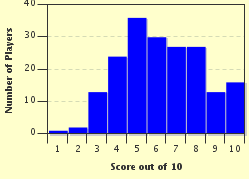Quiz Answer Key and Fun Facts
1. In which year did Earl Byrhtnoth lead the English against a Viking force at the Battle of Maldon?
2. William Shakespeare and Christopher Marlowe, two of the greatest dramatists of the English Renaissance, were born in the same year. Which year was it?
3. King Richard II and Geoffrey Chaucer both died in which year?
4. Renaissance England was one of the great eras of theater, with such dramatists as Shakespeare, Ben Jonson, Marlowe, John Webster, and Thomas Middleton. That era was abruptly ended when the theaters were all forced to close in which year?
5. What occurred in England in 1386/1387?
6. The Norman conquest of England occurred on October 14 in which year?
7. A very significant date in English history was 6th June 1215. What major event occurred then?
8. In which year did William Caxton introduce printing to England?
9. Prior to the closing of London's theaters by the Puritans in 1642, no English actress had appeared on the stage. In which year, following the Restoration of Charles II to the English throne, did the first English actress appear on an English stage?
10. At the famous Battle of Bannockburn, the Scots defeated the English. In what year was that battle?
Source: Author
lowtechmaster
This quiz was reviewed by FunTrivia editor
gtho4 before going online.
Any errors found in FunTrivia content are routinely corrected through our feedback system.

